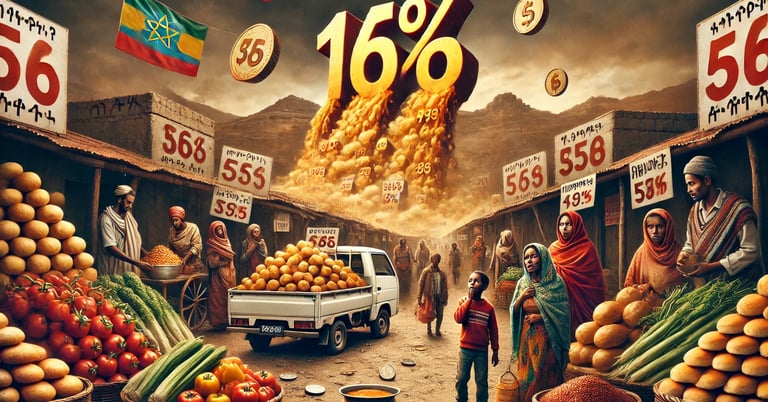Is 16% Inflation Good Enough? Ethiopians Demand More!!
A chilling silence hung over the bustling Merkato market as traders huddled together, their faces etched with worry. The once-vibrant marketplace, a symphony of haggling and laughter, was now a somber testament to the relentless grip of inflation.....
ECONOMY AND STOCK MARKET
12/30/20242 min read


"Just yesterday, a kilo of tomatoes was 50 birr," lamented a fruit vendor, his voice barely a whisper. "Today, it's 70. How am I supposed to feed my family?" His despair echoed the sentiments of countless Ethiopians grappling with the escalating cost of living.
The government, acknowledging the mounting pressure, has hailed recent reforms as a beacon of hope. Governor Mamo Mihretu of the National Bank of Ethiopia declared that the "comprehensive macroeconomic reforms" have yielded "tangible successes," citing a decline in inflation from a staggering 30% to the current 16%.
However, for ordinary Ethiopians, the relief is far from tangible. The scars of skyrocketing prices run deep. Families have been forced to make agonizing choices, sacrificing essential needs like healthcare and education to put food on the table. Small businesses, the backbone of the economy, teeter on the brink of collapse as rising costs erode profit margins.
The government's claims of a foreign exchange windfall and a burgeoning financial sector offer little solace to those struggling to survive. The specter of hunger haunts households, and the dream of a prosperous future seems to fade with each passing day.
As the nation grapples with the lingering effects of inflation, the question remains: Are the reforms enough to lift Ethiopia out of the shadows of economic hardship, or will the specter of rising prices continue to cast a long shadow over the lives of its people?
The shadows cast by inflation stretch far beyond the market stalls. In the hushed corridors of hospitals, whispers of families unable to afford life-saving treatments grow louder. Children, once enrolled in vibrant classrooms, now stare blankly at the walls of their homes, their educations sacrificed on the altar of rising costs.
Even government employees, the very pillars of the state, are not immune to the biting grip of inflation. Many skip lunch, their meager salaries unable to keep pace with the escalating cost of basic necessities. The promise of public service, once a beacon of hope for many, now feels like a distant mirage.
While the government boasts of a decline in inflation from a staggering 30% to the current 16%, it's crucial to understand that this does not signify a decrease in prices. Rather, it indicates that the rate of price increases has slowed down. Prices are still climbing, albeit at a slower pace. For many Ethiopians, a 16% inflation rate remains a daunting figure, a constant erosion of their purchasing power.
The government's initiatives to curb inflation, such as reforms in monetary policy and efforts to boost production and productivity, are undoubtedly commendable. However, more needs to be done. Single-digit inflation is the ultimate goal, a level that would provide much-needed relief to households and breathe life back into the vibrant private sector.
The path ahead is fraught with peril. The specter of social unrest looms large as desperation sets in. The government faces a critical juncture: will it heed the cries of its people, including its own employees, and implement policies that truly alleviate suffering, or will it remain ensconced in its narrative of progress, blind to the harsh realities faced by millions of Ethiopians?
The answer to this question will determine not only the fate of the economy but also the very fabric of Ethiopian society.


